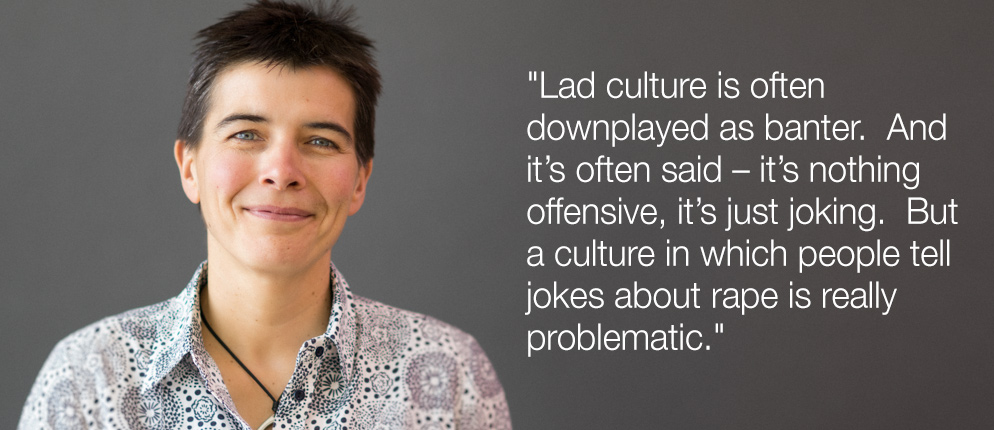
‘Laddism’ or ‘lad culture’ has been at the forefront of Prof. Carolyn Jackson’s research for the past 15 years. As the professor of gender and education at Lancaster University, UK, defines it, “a bit of a jolly term for what really is sexual harassment.”
As stories about laddism in higher education filled UK headlines in recent years, her research, likewise, shifted to focus on the same.
During a recent visit to UofGH, Prof. Jackson spoke to us about the role universities are playing – and should play – in a culture of laddism.

Q&A with Prof. Carolyn Jackson, Lancaster University
Having spoken with students and staff at universities in the UK, can you give a sense of the scale of this problem? How big an issue is laddism in higher education?
It’s become such a big issue in the UK – it’s very problematic. I’ve spoken with students who reported sexual harassment has become so normalized that often women don’t think to challenge or report it. Even serious incidences suffer from serious underreporting.
So there’s an issue about staff not really knowing what’s going on in universities, and so trying to get a sense of the scale is difficult, [though] the consensus seemed to be that lad culture is an issue.
But I think what is clear, is that in some contexts, lad cultures do dominate social spaces. It’s associated with men who objectify women, and is often linked to alcohol and sport, particularly rugby in the UK. It might not necessarily mean that most men are laddish - I’m not saying that at all. We know that even if a small minority of men in a certain context is laddish, they can still be dominant.
A few statistics from research conducted by the National Union of Students, UK, which I find to be depressing, though not surprising: It found that 68% of women had experienced verbal or non-verbal harassment; more than 1 in 10 women were victims of serious sexual assault; and 62% had heard a joke about rape or sexual assault at university.
I imagine much of this culture could be goaded by jokes.
Lad culture is about banter. It’s often downplayed as banter. And it’s often said – it’s nothing offensive, it’s just joking. To some degree, there’s a notion of, It’s just boys being boys. It’s just what men do. There’s almost a sense in which it’s naturalized and excused on those grounds.
But a culture in which people tell jokes about rape is really problematic. We can’t accept it in a time when we’re working toward social justice and equality.
The phrase in a popular lad mag was ‘for men who should know better.’ So there’s this notion that it is a very thoughtful and deliberate response. Which leads to the notion that it’s ironic, in that it’s just being playful. But it’s not. You can hide so much around this notion that you’re just joking.
It needs challenging.
How is it currently being challenged?
I don’t believe the universities themselves are doing a great deal - but student unions are. Student unions have created zero tolerance policies, [they’ve held] consent workshops on campus, they’ve created a Good Lad project at Oxford and are trying to promote a masculinity that’s more aware, less laddish. They’re running workshops around what is consent, what problems arise with banter, tackling the very culture.
Interesting that you’ve addressed tackling the culture, as opposed to the individual.
At the moment, institutions seem to be tackling on an individual basis. So they’ll report about a particular student, and they’ll discipline that particular student. You can see why – they just deal with the kinds of reports they get. It’s a very reactive approach, as opposed to trying to change the culture. But they need to do more in order to tackle lad culture. There really needs to be a culture shift.
How else might universities support such change?
By being open to recognizing it. There’s a tendency for universities to not want to admit that there are issues with this. They don’t want to damage their reputation, and certainly wouldn’t want people to think it’s a particular problem at their institution – whereas, of course, it’s an issue everywhere.
If universities were a bit more open about it and engaged in dialogue about it, they could probably be more preventive.
This interview has been edited for clarity and length.

